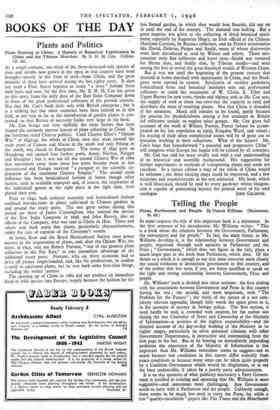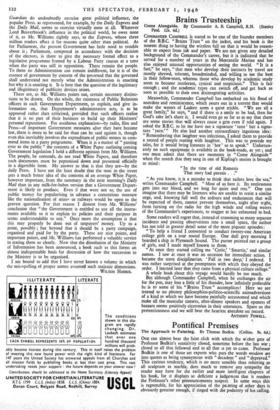Telling the People
Press, Parliament and People. By Francis Williams. (Heinemann. 8s. 6d.)
IN some respects the title of this important book is a misnomer. In the first sentence of his introduction Mr. Williams writes : " This is a book about the relations between the Government, Parliament, the newspapers and the people." In fact, the main theme, as Mr. Williams develops it, is the relationship between Government and people, organised through such agencies as Parliament and the Press ; " Government," which does not figure in the title, plays a much larger part in the book than Parliament, which does. Of the theme as a whole it is enough to say that none concerns more closely the sound evolution of democratic government in this country, and of the author that few men, if any, are better qualified to speak on the right and wrong relationship between Government, Press and people.
Mr. Williams' book is divided into three sections: the first dealing with the associations between Government and Press in this country during the war ; the second, and most important, with " The Problem for the Future " ; the third, of the nature of a not com- pletely relevant appendix, though fully worth the space given to it, to the question of secrecy in foreign policy. The first section, it need hardly be said, is crowded with interest, for the author was during the war Controller of News and Censorship at the Ministry of Information—a position of .the highest responsibility—and his detailed account of the day-to-day working of the Ministry in its higher ranges, particularly its often animated relations with other Government Departments, is instructive and entertaining from the first page to the last. But in its bearing on immediately ,impending problems the experience of the Ministry of Information is less important than Mr. Williams sometimes seems to suggest—not so much because war conditions in this matter differ radically from peace conditions as because many steps can be taken quite properly by a Coalition Government which would be illegitimate, or to say the least undesirable, if taken by a purely party administration.
It is on this question of what publicity machinery a Party Govern- ment is justified in creating and operating that Mr. Williams is most
suggestive—and sometimes most challenging. Any Government needs to carry with it Parliament and the people. Curiously enough, there seems to be much less need to carry the Press, for while a few " quality-circulatidn " papers like The Times and the Manchester
Guardian do undoubtedly exercise great political influence, the popular Press. as represented, for example, by the Daily Express and the Daily Mail, seems to exercise virtually none at all. Whatever Lord Beaverbrook's influence in the political world, he owes none of it, as Mr. Williams rightly says, to the Express, whose three million readers affect it for reasons quite other than political. As for Parliament, the present Government has little need to trouble about it ; Parliament, composed in accordance with the decision of the electors, is there to give the necessary formal effect to a legislative programme framed by a Labour Party caucus at a time when the party was still in opposition. There remain the people. To them no Administration can remain indifferent, for it is of the essence of government by consent of the governed that the governed shall understand not merely what the Administration is enacting but why it is enacting it. It is here that the question of the legitimacy and illegitimacy of publicity devices arises.
There are, as Mr. Williams points out, certain necessary distinc- tions to be drawn. On the whole, the existence of Public Relations officers in each Government Department, to explain, and give in- formation on, that Department's administrative acts, is to be approved rather than criticised, provided that such officers realise that it is no part of their business to build up their Ministers' personal reputations. For assiduous explanation—by radio, film and Press—of important Government measures after they have become law, there is more to be said for than can be said against it, though even this inevitably involves the expenditure of public money to com- mend items in a party programme. When it is a matter of " putting over to the public " the contents of a White Paper outlining coming Government legislation I hold a different opinion from Mr. Williams. The people, he contends, do not read White Papers, and therefore such documents must be peptonised down and presented officially in a digestible form. My answer to that is that they are—by the daily Press. I have not the least doubt that the man in the street gets a much better idea of the contents of an average White Paper, however important, from the summary in the next morning's Daily Mail than in any milk-for-babes version that a Government Depart- ment is likely to produce. Even if that were not so, the use of public money for popularising in advance a contentious measure like the nationalisation of mines or railways would be open to the gravest question. For that reason I dissent from Mr. Williams' conclusion that " the Government is entitled to use all the instru- ments available to it to explain its policies and their purpose in terms understandable to any." Once more the assumption is that this may properly be done out of taxpayers' money. Up to a point, possibly ; but beyond that it should be a party campaign, organised and paid for by the party. These are nice points, and important points, and Mr. Williams has performed a valuable service in stating them so clearly. Now that the dissolution of the Ministry of Information has been announced, a book such as this forms an almost indispensable basis for discussion of how the succession to the Ministry is to be organised.
I am bound to add that I have never known a volume in which the mis-spelling of proper names assumed such majestic dimensions. WILSON HARRIS.



























 Previous page
Previous page